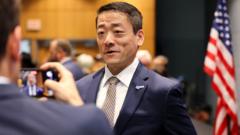Will European Leaders Save Ukraine from Capitulation?

European Leaders' Urgent Trip to Washington: A Strategic Response to Trump's Shift in Ukraine Policy
In the world of international diplomacy, few events can shift the landscape as dramatically as a sudden change in a major player's strategy. Recently, European leaders, including President Macron of France and Italy's Prime Minister Georgia Meloni, found themselves compelled to abandon their summer plans and converge in Washington. Their mission? To safeguard not only the future of Ukraine but also the broader security of Europe amidst a worrying change in U.S. policy under President Trump. This article delves into the complexities of this diplomatic maneuvering, the implications for European security, and the potential outcomes of these high-stakes discussions.
The Urgency Behind the Diplomatic Gathering
The backdrop for this urgent meeting was President Trump's abrupt shift in his stance on the Ukraine conflict. Previously, the U.S. had taken a firm position, advocating for a ceasefire as a precursor to any meaningful peace talks. However, after a meeting with Russian President Vladimir Putin, Trump signaled a pivot towards a potentially more lenient approach, raising alarms among European leaders. The fear was not just about Ukraine's immediate fate but also about the long-term security of the European continent.
European leaders recognized that Trump's new strategy could embolden Russia and jeopardize the hard-won stability in Europe. Their urgency was palpable; changing schedules and cutting vacations short is no small feat for heads of state, particularly in August. Yet, the gravity of the situation warranted such drastic measures, as they scrambled to present a united front and influence U.S. policy before it could solidify.
Key Concerns: The Threat of Capitulation
One of the main points of contention was the notion of capitulation, a term that President Macron highlighted during discussions. He emphasized that any peace proposal put forth by Russia that did not respect Ukraine's sovereignty would be unacceptable. European leaders were united in their stance that peace negotiations should not come at the expense of Ukraine's territorial integrity. The fear was that Trump's newfound willingness to entertain Russian demands could lead to a forced compromise detrimental to European security.
European diplomats voiced their concerns that Trump's perspective could fundamentally alter the balance of power in Europe. The idea that Ukraine might have to cede territory, such as the Donbas region, to Russia was particularly alarming. This would not only undermine Ukraine's sovereignty but could also set a dangerous precedent for other nations facing aggression. European leaders were adamant that any discussions around peace needed to involve genuine commitments from Russia to negotiate in good faith.
The European Strategy: A Unified Front
To counteract Trump's shift in strategy, European leaders aimed to present a cohesive vision of security that encompassed more than just Ukraine’s immediate needs. They sought to convey that the future of Ukraine was inextricably linked to the security of Europe as a whole. By emphasizing collective security, European leaders hoped to persuade Trump that any negotiation must consider broader implications for NATO and the continent's stability.
- Advocating for Strong Military Support: European leaders planned to argue for continued and robust military assistance to Ukraine, ensuring that its armed forces remain capable of defending against future aggression.
- Decoupling Security Guarantees from Russian Demands: They aimed to stress that any security guarantees must not come at the cost of Ukraine's military strength or territorial integrity.
- Long-term Commitment: The argument for sustainable support, including financial aid and military resources, was crucial in reshaping the U.S. understanding of its role in European security.
The Risks of Miscommunication
As the European leaders prepared to engage with Trump, they faced the daunting task of balancing assertiveness with diplomacy. There was a palpable risk that pushing too hard could lead to backlash, with Trump potentially perceiving their efforts as bullying. The last-minute nature of their gathering added to the challenge, as differing opinions on the extent of European commitment to Ukraine’s future security emerged among leaders.
In navigating this complex landscape, European diplomats were tasked with ensuring that their message was clear and unified. They needed to articulate the necessity of maintaining a strong defense for Ukraine without antagonizing the U.S. administration. This delicate balancing act was crucial to avoid further destabilizing an already precarious situation.
Charting the Path Forward
Looking ahead, European leaders expressed a desire to slow down the conversation around immediate land swaps and territorial concessions. They sought to establish a framework for future negotiations that would prioritize a ceasefire as a prerequisite for any discussions. The notion of a trilateral summit involving Trump, Zelensky, and Putin emerged as a potential avenue for progress, focusing on broad principles that would guide future agreements.
Moreover, the establishment of a European-based reassurance force was on the table as a long-term strategy for post-conflict Ukraine. This concept aimed to provide a robust presence that could deter future aggressions and assure European nations of their collective security. A clear outline of how such a force would function and its role in Ukraine’s future remained to be defined, presenting another layer of complexity in the ongoing discussions.
Conclusion: A Moment of Jeopardy
The recent convergence of European leaders in Washington underscores a pivotal moment in the ongoing Ukraine conflict. With Trump's shift in policy posing potential threats to European stability, the urgency for a united European response has never been more acute. The coming days will be critical as leaders strive to influence U.S. policy and ensure that any negotiations reflect the security needs of the continent and uphold Ukraine's sovereignty.
As the dynamics of international diplomacy continue to evolve, one must ponder: what will be the lasting implications of this meeting for the future of Europe and its relationship with Russia? The stakes are high, and the world watches closely as these leaders navigate the complexities of peace, security, and diplomacy in an increasingly unpredictable climate.
Frequently Asked Questions
What prompted the urgent meeting of European leaders in Washington?
European leaders were compelled to meet urgently in response to President Trump's abrupt shift in U.S. policy regarding Ukraine, which raised concerns about the potential for capitulation to Russian demands.
What were the key issues discussed during the meetings?
The meetings focused on several key issues, including the need for continued military support for Ukraine, the importance of ensuring Ukraine's territorial integrity, and the broader implications for European security.
How might this affect the future of Ukraine?
The outcome of these discussions could significantly influence Ukraine's future, particularly regarding military support, territorial negotiations, and the overall security framework within Europe.
As the situation unfolds, how do you envision the balance of power in Europe shifting in light of these developments? #Ukraine #EuropeanSecurity #Diplomacy
Published: 2025-08-18 15:42:04 | Category: technology



